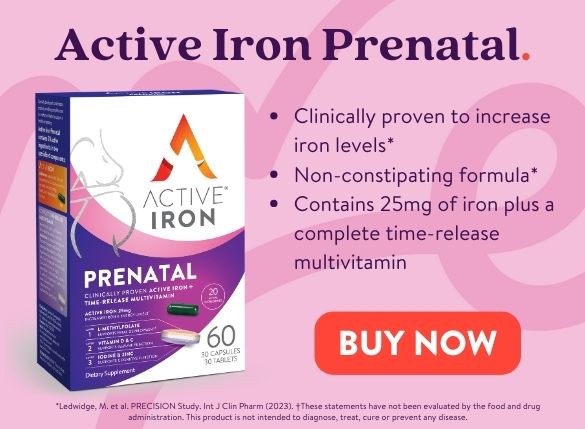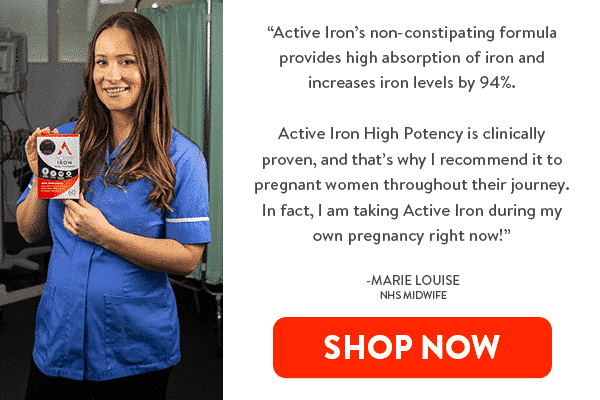- Why do pregnant women need iron?
- Importance of iron in pregnancy
- When should a pregnant woman start taking iron?
- In which trimester is iron most important?
- The benefits of taking iron during pregnancy
- How much iron does a pregnant women need?
- How can I increase my iron levels during pregnancy?
- Iron rich foods to eat in pregnancy
- Taking iron supplements in pregnancy
- Iron in pregnancy: conclusion

Marie Louise Hurworth
BSc (Hons) RM & PTTLS
Iron in Pregnancy: How much Iron does a Pregnant Woman Need?
In this guide on iron in pregnancy, you will learn more about the fascinating and incredible changes that occur during pregnancy to support your growing baby, what exactly leads to increased iron requirements, the importance of iron intake during pregnancy and how to meet your iron requirements.

Why do pregnant women need iron?
There are many physiological changes that occur to support the growing baby during pregnancy. For example, a pregnant woman’s blood volume gradually increases by up to 50% in pregnancy, but her red blood cells do not increase equally.
This leads to a natural hemodilution, more than any other time in the lifespan of a human.

Overall, there is a 2-3 fold increase in iron requirements, and inadequate iron levels affect a huge number of women: up to 20% of pregnant women, equating to almost a quarter of a million women every year in the UK alone.
It can be difficult to get enough iron from food alone, and it’s estimated that up to 20% of women already have inadequate levels at their booking appointment – the first appointment they have with a healthcare professional. While we can get iron from food, it may not be well absorbed or in the sufficient quantities needed to meet the increased iron requirements at play during pregnancy. Once you develop inadequate iron levels in pregnancy, diet alone can’t increase levels enough. In this case, iron supplementation is recommended.
Importance of iron in pregnancy
Iron is a vital mineral that plays an important role, not only in oxygen transport but also in normal energy metabolism, cognitive function, immune function, cell division, and the formation of red blood cells and hemoglobin. Despite the importance of iron, nearly 2.1 billion people worldwide are living with insufficient iron levels, regardless of their country of origin or their economic situation.
Having inadequate iron levels during pregnancy is common, but has many wide-ranging health implications for both the mother and baby. Iron supports a healthy pregnancy for both mom and baby.
The number of complications associated with having inadequate iron is rather concerning, but there are many ways that we can support women and prevent inadequate iron levels from developing.
While iron supplementation can help prevent a pregnant woman from developing inadequate iron levels, it is particularly important for certain groups:
● Two closely spaced pregnancies <1 year
● Pregnant with more than one baby
● Follows a vegetarian or vegan diet
● Teenage pregnancy
● Doesn’t consume enough iron-rich foods
● Has a heavy pre-pregnancy menstrual flow
● Recent history of significant bleed
● Has a history of inadequate iron levels before pregnancy
When should a pregnant woman start taking iron?
Insufficient iron is progressive, and is generally described in terms of three stages of increasing severity:
1. Depletion of iron stores
2. Impaired hemoglobin production
3. Iron deficiency anemia
Until becoming pregnant, many women may not have ever had their iron levels checked, or considered the possibility of having inadequate iron levels. For women who are trying to conceive, iron intake is very important, and identifying individual risk of developing, or already having inadequate iron levels is paramount to avoiding further symptoms.

In which trimester is iron most important?
Iron intake is particularly important in the last trimester of pregnancy, as this is when the growing baby begins to build their own iron stores in preparation for the first six months of life. These stores are used until babies start on solid foods.

However, early intervention may encourage the maintenance of iron levels throughout pregnancy and may reduce the need for much more expensive, risky, and uncomfortable treatments later on in pregnancy. This is especially true for women who are at an increased risk of developing inadequate iron levels.
The benefits of taking iron during pregnancy
Many mothers may feel affected by the symptoms of inadequate iron levels during pregnancy, including tiredness, fatigue, and difficulty concentrating. These symptoms are not limited to pregnancy, either, meaning women may mistake these symptoms for just the regular exhaustion after birth.
The benefits of taking iron can’t be understated when required, and ensuring that you have adequate iron intake throughout pregnancy will lead to a healthier pregnancy.
Iron intake plays a vital role in supporting a healthy pregnancy for both mother and baby, but may also lead women to having more enjoyable pregnancies in general, by reducing symptoms such as tiredness or poor functionality.
After taking iron supplements, many women go from feeling exhausted to having more stable energy levels, and looking and feeling much better overall.
How much iron does a pregnant women need?
As mentioned, iron requirements increase significantly during pregnancy, and it is important to think about iron intake in order for you to meet the new demands of the placenta, growing baby, and extra blood volume.
The World Health Organization recommends an iron intake of 30mg per day during pregnancy.
How can I increase my iron levels during pregnancy?
Essential minerals, like zinc, magnesium, sodium, and iron, aren’t made by our bodies. They come from rocks, soil, and water. Plants absorb these minerals as they grow. Then, when we eat the plants or eat an animal which has eaten those plants, our bodies receive the minerals we need to live. Iron, therefore, has to come in through our diets. Iron supplements can be a great way to hit your daily nutritional requirement, particularly if you are pregnant, to ensure you’re reaching your daily requirement.

Some foods act as barriers to our body’s ability to absorb iron sufficiently. Even if you’re eating foods high in iron, your body might not be absorbing it all, especially if your diet also contains these foods. Foods that inhibit iron absorption include:
● Dairy
● Eggs
● Tannins (found in tea and coffee)
On the other hand, while some foods can inhibit the absorption of iron, other foods and vitamins can enhance our ability to absorb iron. Foods that have high iron content, or increase iron absorption include:
● Vitamin C
● Beta-Carotene
● Beef, Chicken & Fish
Choosing an iron supplement that is well-absorbed can also ensure you are getting the maximum amount of iron from your supplement. For example, Active Iron has 2X better absorption compared to standard iron sulfate, meaning the iron in each capsule is highly bio-available.
Iron rich foods to eat in pregnancy
Eating a rich and varied diet filled with nutrient dense foods, essential vitamins, and minerals means you are supporting your body in getting what it needs both to maintain your own health and wellbeing, as well as that of your baby’s.

When it comes to diet and iron intake, it may be helpful to know that there are two types of iron in food: iron from animal products, known as heme iron, and iron from plant foods, known as non-heme iron. Heme iron is absorbed by the body far better than non-heme iron, and red meat is a rich source of iron. Non-heme iron is found in plant foods such as: kidney beans, chickpeas, lentils, and fermented soy products like tofu.
See full list below:
● Red meat
● Fish
● Poultry
● Chickpeas
● Tofu
● Lentil
● Green peas
● Tomato juice
● Broccoli
● Unsulphured dried apricots or raisins
● Spinach
● Fortified cereal
● Sauerkraut
● Seeds
Due to the greatly increased requirements, it may not be possible to get all that you need through diet alone. Therefore, taking an iron or pregnancy supplement can ensure that you are getting everything that you need.
Taking iron supplements in pregnancy
As identified, getting enough iron from diet alone can be tricky, and so supplementation is often recommended. Supplementing with iron from the first trimester of pregnancy, especially for those that are of an increased risk of inadequate iron levels, can help avoid the need for high dose oral iron later on in pregnancy.

High dose oral iron can often lead to uncomfortable side effects for the mother, such as constipation, nausea and diarrhea – some of which you may be already experiencing during pregnancy.
Liquid iron supplements are often proposed as an alternative for those who experience side effects from oral irons. It is suggested that the liquid format is gentler on the stomach and easier for the body to absorb. However, liquid iron supplements often contain very low levels of iron, and therefore the dose may be inadequate for mother and baby’s combined iron requirements.
Active Iron is different. Its groundbreaking formula is clinically proven to deliver 2X better absorption of iron sulfate and is 6X less likely to cause gut irritation compared to other iron supplements. This means it helps avoid the common side effects of iron supplements, including constipation and nausea, making it Kind & Strong.
Active Iron is also clinically proven to increase iron stores by 94%, resulting in a significant improvement in energy levels.
Active Iron Prenatal is a great option because it contains non-constiapting Active Iron plus a complete time-release multivitamin and is recommended by healthcare professionals.

Iron in pregnancy: conclusion
Iron is a vital mineral that supports the transportation of oxygen, amongst other things, and is especially important during pregnancy. All women need more iron during pregnancy, and should consider iron supplementation early in pregnancy. It is a great idea to discuss this with their healthcare professional to help avoid developing inadequate iron levels, and steer away from the nasty side effects of high dose oral iron.

Key points:
● Iron requirements significantly increase during pregnancy.
● There are several known factors that increase your risk of developing inadequate iron levels.
● It is important to include either animal and/or plant-based sources of iron in your diet.
● Supplementing with iron early in your pregnancy can increase iron levels and avoid the need for high dose oral iron if iron levels deplete further.
● Not all iron supplements are equal – Active Iron’s Kind & Strong formula is non-constipating and clinically proven to increase iron levels.

Marie Louise Hurworth
BSc (Hons) RM & PTTLS
Marie Louise is a Pregnancy Advisor for Active Iron as well as a Prenatal Course Educator & experienced Midwife for the NHS and Author of ‘Pregnancy, Birth & Beyond’.


